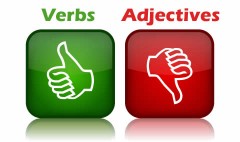Harvard Lesson: Verbs Beat Adjectives
 The debate among copywriters about verbs vs. adjectives rages on. While the general consensus is that verbs make better sales copy and adjectives serve mainly to slow down the reader, there’s also research that shows properly used adjectives can increase product appeal.
The debate among copywriters about verbs vs. adjectives rages on. While the general consensus is that verbs make better sales copy and adjectives serve mainly to slow down the reader, there’s also research that shows properly used adjectives can increase product appeal.
Lessons from Harvard B-School
If you think your sales challenge is daunting, try selling yourself to Harvard Business School. Even though most applicants are amazingly well qualified in terms of academic, career, and personal accomplishments, almost 9 out of 10 are rejected. When the Wall Street Journal interviewed Dee Leopold, managing director of MBA admissions at Harvard, she weighed in on the adjective vs. verb debate and came down on the side of verbs.
When asked about letters of recommendation, Leopold commented,
The best recommendations have a lot of verbs. They say, “She did this,” versus adjectives that simply describe you.
When you think about it, a letter of recommendation is really sales copywriting. Normally, it is written for someone whom the recommender likes and wants to assist in the next stage of their education or career. While such a letter should not be overtly a work of persuasion, the intent is usually to paint a favorable (even if reasonably accurate) picture of the candidate.
Why Verbs Persuade
There are multiple reasons to choose verbs over adjectives. First, adjectives on their own don’t say all that much and are easy to throw in without real justification. Describing a candidate as “dedicated, focused, and creative” is a quick way to satisfy the need for a favorable comment and get the recommendation on its way.
Similarly, a product could be, “economical, long-lasting, and easy to use.” In both cases, though, the reader has nothing to go on other than the word of the writer, who is almost certainly biased in favor of creating a good impression. Vague positive characteristics will get filtered out as puffery.
Action verbs force the writer to get specific – “created a series of ads,” “led a team of engineers,” “worked through a holiday,” and so on require actual examples of the behaviors or characteristics in question. A product might “outlast other brands by 10,000 hours,” or “cut maintenance costs by 25%.” These specifics will increase the credibility of the copy, in addition to providing more information that when the adjective-driven shortcut is taken.
Verbs Rule, Adjectives Serve
Even if verbs are the main driver of the sales copy, adjectives still have some use. In particular (as described in Adjective Power), adjectives that are vivid, sensory, specific, or emotion-inducing can be potent copy enhancers.
In short, verbs should be the “entree” of the copywriting meal. Adjectives should be used sparingly, to season and enhance the appeal of the main course.
